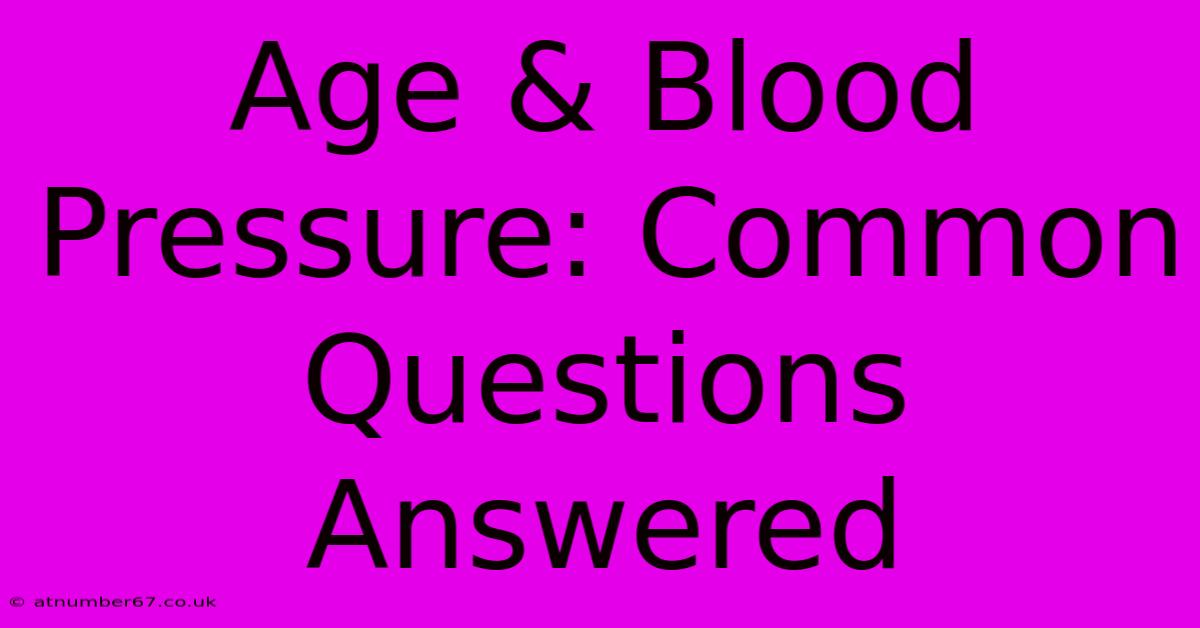Age & Blood Pressure: Common Questions Answered

Table of Contents
Age & Blood Pressure: Common Questions Answered
Understanding your blood pressure is crucial at any age, but as we get older, it becomes even more important. This article addresses common questions about the relationship between age and blood pressure, offering insights into what's normal, what's concerning, and what steps you can take to maintain healthy blood pressure throughout your life.
Why Does Blood Pressure Change With Age?
As we age, our blood vessels naturally become less flexible and more rigid. This stiffening, known as arteriosclerosis, makes it harder for blood to flow smoothly, leading to increased pressure against artery walls. This is a key reason why blood pressure tends to rise with age. Other contributing factors include:
- Decreased kidney function: Kidneys play a role in regulating blood volume and pressure. Age-related decline in kidney function can disrupt this process.
- Hormonal changes: Fluctuations in hormones, particularly after menopause in women, can impact blood pressure.
- Lifestyle factors: Unhealthy habits like smoking, poor diet, lack of exercise, and excessive alcohol consumption exacerbate age-related blood pressure increases.
What's Considered Normal Blood Pressure at Different Ages?
There isn't a single "normal" blood pressure for all ages. However, the American Heart Association (AHA) provides guidelines. Ideally, you should consult your doctor for personalized advice based on your individual health history and risk factors. Generally speaking:
- Childhood and Adolescence: Blood pressure norms vary significantly with age and size. A doctor will use age-specific charts to evaluate blood pressure in children and teens.
- Adulthood (18-64): A blood pressure reading below 120/80 mmHg is generally considered optimal. Readings between 120/80 mmHg and 139/89 mmHg may indicate prehypertension, requiring lifestyle changes and close monitoring.
- Older Adults (65+): While the ideal remains below 120/80 mmHg, a slightly higher reading (up to 140/90 mmHg) might be considered acceptable for some older adults, depending on their overall health and other risk factors. This is a nuanced area, and individual assessment by a physician is crucial.
Understanding Blood Pressure Readings:
A blood pressure reading consists of two numbers:
- Systolic Pressure (top number): The pressure in your arteries when your heart beats.
- Diastolic Pressure (bottom number): The pressure in your arteries when your heart rests between beats.
What Are the Risks of High Blood Pressure?
High blood pressure (hypertension) increases the risk of numerous serious health problems, including:
- Heart attack: High blood pressure strains the heart, increasing the chance of a heart attack.
- Stroke: High blood pressure damages blood vessels in the brain, leading to strokes.
- Kidney failure: High blood pressure damages the kidneys over time.
- Dementia: Studies suggest a link between high blood pressure and an increased risk of cognitive decline and dementia.
How Can I Manage My Blood Pressure as I Age?
Maintaining healthy blood pressure involves a combination of lifestyle changes and, if necessary, medication. Speak to your doctor before starting any new diet or exercise regimen, or changing your medications.
Lifestyle Strategies:
- Healthy Diet: Focus on fruits, vegetables, whole grains, and lean protein. Reduce sodium intake significantly.
- Regular Exercise: Aim for at least 150 minutes of moderate-intensity aerobic exercise per week.
- Weight Management: Maintain a healthy weight to reduce strain on your heart and blood vessels.
- Stress Management: Practice stress-reducing techniques like meditation, yoga, or deep breathing.
- Limit Alcohol: Moderate alcohol consumption at most.
- Quit Smoking: Smoking severely damages blood vessels.
- Monitor Blood Pressure: Regularly check your blood pressure at home or at your doctor's office.
When Should I See a Doctor?
Consult your doctor immediately if you experience:
- Sudden, severe headaches.
- Dizziness or lightheadedness.
- Shortness of breath.
- Chest pain.
- Nosebleeds.
- Vision changes.
Regular checkups are essential for monitoring blood pressure, especially as you age. Early detection and management of high blood pressure can significantly reduce the risk of serious health complications. Don't hesitate to discuss your concerns with your healthcare provider. They can provide personalized advice and develop a plan tailored to your individual needs and health history.

Thank you for visiting our website wich cover about Age & Blood Pressure: Common Questions Answered. We hope the information provided has been useful to you. Feel free to contact us if you have any questions or need further assistance. See you next time and dont miss to bookmark.
Featured Posts
-
Decoding Halle Baileys Impressive Net Worth
Mar 31, 2025
-
Maxine Waters Daughter Is It Fair Or Foul
Mar 31, 2025
-
Amber Roses Net Worth A Public Figures Fortune
Mar 31, 2025
-
Kendrick Lamars Net Worth The Surprising Story
Mar 31, 2025
-
The Real Oshadi Hewamadduma Age Revealed
Mar 31, 2025
